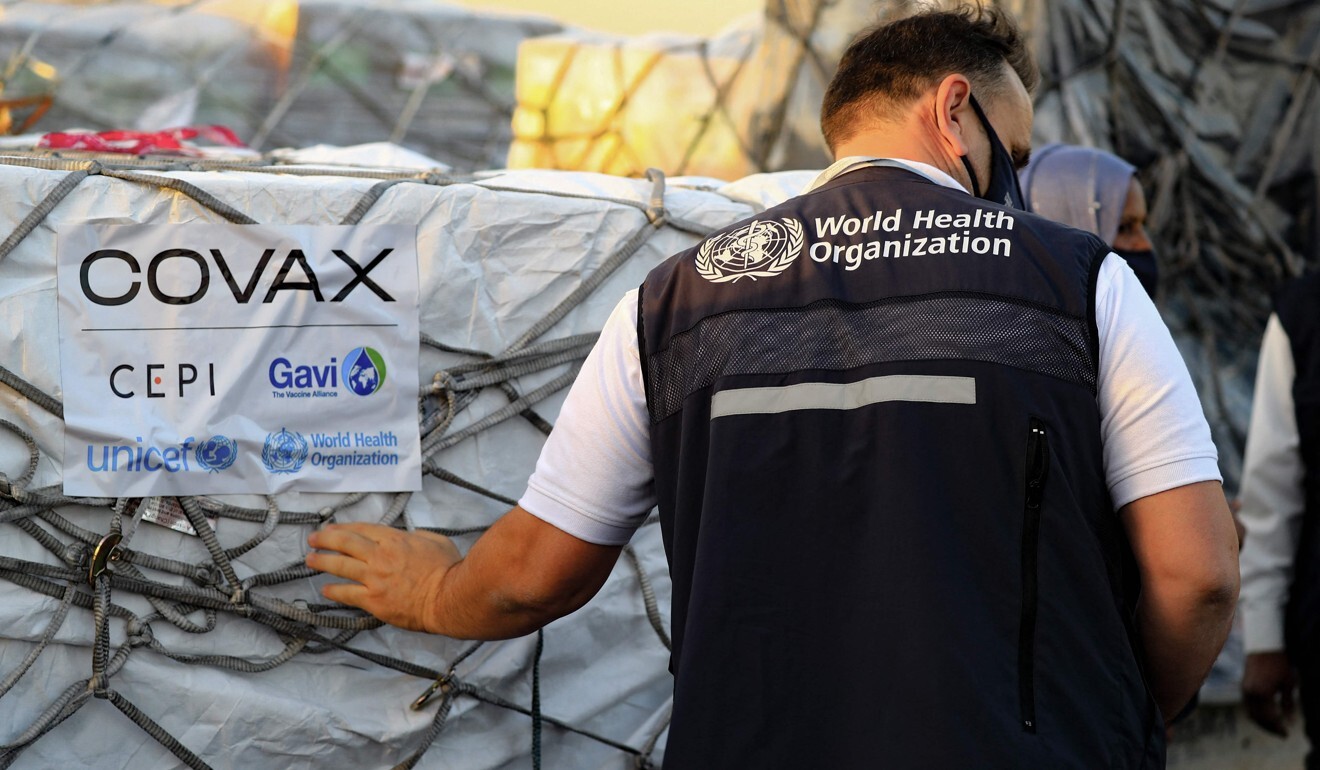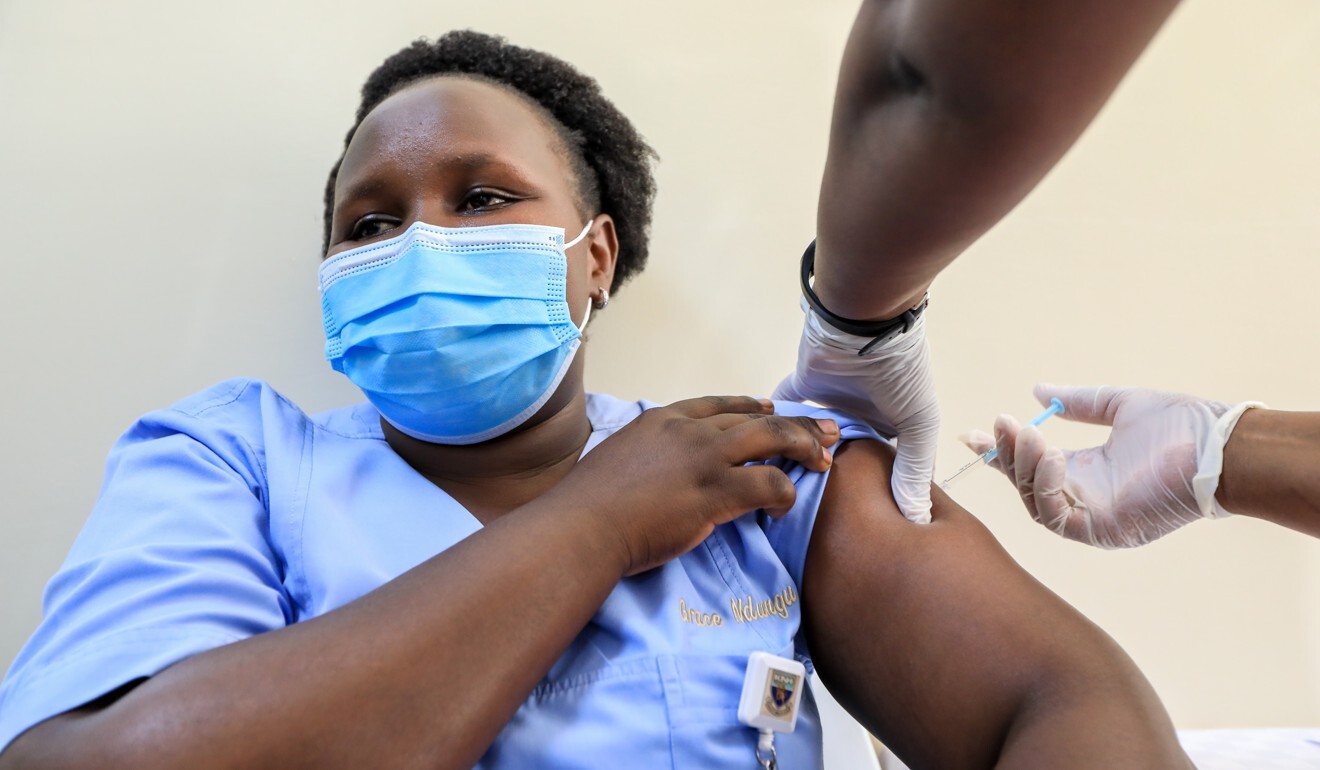
‘Vaccine apartheid’: how white privilege is woven into the fabric of globalisation
- The roll-out of Covid-19 vaccines, with poor countries far behind, has exposed the moral bankruptcy and structural privilege of Western nations
- What can be done? They should shed their ideas of moral authority and a monopoly on scientific expertise, even amid insecurity about China’s rise
But for billions around the world, that same feeling of relief will not come for months, if not years, and many are resigned to it. Global organisations have warned that controlling the pandemic will take years under the current rate of vaccination. The OECD said some poor countries may not be able to start vaccination campaigns until 2024.
The Covax Facility, the WHO’s initiative to get vaccines to these countries, has according to some sources, only raised only a third of its predicted budget. According to the UN, 10 countries have administered 75% of all vaccinations worldwide while 130 countries have yet to receive a single dose. G7 countries have secured enough vaccines for each of their citizens to be vaccinated three times over and thereby undermining the Covax effort.
Why isn’t Vietnam keen on China-made vaccines?
The vaccine has exposed the moral bankruptcy of rich Western nations, who are poor in action despite being rich in rhetoric.
Winnie Byanyima, currently of UNAids and formerly of Oxfam, proposed that “we are witness to a vaccine apartheid”, where poor countries are unable to purchase vaccines at the same scale and price as rich countries.
The virtual G7 meeting last month attempted to address this accusation yet statements by Western leaders revealed how out of touch they are with non-Western positions about making the vaccine a global good. Instead, they seem fixated on maintaining an ill-conceived notion about the superiority of Western values and ensuring that vaccines from China and Russia are not used as instruments of diplomacy.

After all, there surely isn’t much wrong if vaccine diplomacy saves lives, irrespective of where they come from. For the needy in poor countries, ‘diplomacy’ is a whole lot better than ‘apartheid’ even if the vaccine has a Chinese or Russian name.
All of this however offers an opportunity to reflect on the charade of international outrage about white privilege and the call for change. From the George Floyd protests, to white supremacists storming the US Capitol in Washington, to more recent reports on black soccer players in the UK experiencing a surge of racist attacks online, the pattern is always the same: media coverage and outrage before returning to “business as usual”.
The cause is not that racism is rooted in a few individual bad actors, but rather that it is deeply embedded in the psyche of Western societies. It manifests in ways that go beyond the actions of a few overt white supremacists.
Covid-19 vaccines are the most recent manifestation of how the West’s structural privilege, backed by economic power and relentless desire for dominance, affects today’s world and hampers global solutions.
First, the West’s economic dominance means that human capital and economic resources are captured and hoarded by Western countries, allowing them to corner the market for vaccines. Brain drain is one example. So many of those responsible for vaccine development, such as the US Operation Warp Speed’s former head Moncef Slaoui, have origins in non-Western countries.
Almost every wealthy country has placed orders for vaccines two to three times greater than their populations. Canada has ordered six times the vaccines needed. Why? So much for all the talk about making the vaccine a global good.
China says stockpiling of Covid-19 vaccines by rich countries needs to stop
The problem is not that countries overbought, but rather that they do not have a plan to donate or release their purchasing commitments.
Will Berlin or Paris choose to let go of some of these doses after they have vaccinated their at-risk populations? The likelihood is that these countries will not consider releasing their commitments until all their people – including those with a lower risk – are vaccinated.
More generally, we see how politics and nationalism trump global need despite the proselyting of Western leaders. The United Kingdom is currently one of the world leaders when it comes to vaccination rates. And while credit should be given to the NHS, it is also true that London could get first dibs on the AstraZeneca vaccine because it is manufactured in the UK (much to the chagrin of the Europeans, who are now facing supply shortages). The shameless efforts of the former US administration that American needs come first is another example.
The way the world talks about non-Western vaccines also shows structural Western privilege and deep-rooted racism.
Most conversations about vaccines in the West revolve around those from Western companies: Pfizer, AstraZeneca, Moderna, Johnson & Johnson, and Novavax. Positive news about Western vaccines is publicised widely and has driven stock market rallies.
However, there are an array of other non-Western vaccines: China’s Sinopharm and Sinovax, Russia’s Sputnik, and India’s Covaxin. For months, these were dismissed as serious options to combat Covid-19 or, worse, viewed with outright suspicion.
For example, Russia’s speedy approvals led to concerns in the West that Moscow was skipping critical steps in the vaccine safety process to score a diplomatic win. Except now that gamble appears to have paid off: a peer-reviewed study in The Lancet suggests that Sputnik has an efficacy rate of over 90 per cent, comparable to the very best Western vaccines.
In addition to transparency concerns, China’s vaccines have also been criticised for being ineffective. When Sinovac’s Brazilian partner noted an efficacy rate of around 50 per cent for preventing mild illness, Western commentators jumped on the number as proof that China was unable to follow through on its technological goals, neglecting far more positive news on Sinovac’s ability to stop moderate and severe illness.

However, when Johnson & Johnson released similar numbers in their trial, the vaccine was still hailed as an important addition to the vaccine portfolio (which, to be clear, it is). Commentators pointed to Johnson & Johnson’s efficacy in preventing moderate to severe illness – much like Sinovac’s offering.
Now, the potential success of these non-Western vaccines is being viewed with suspicion as commentators warn against “vaccine diplomacy”. Shipments of Russian and Chinese vaccines to poorer nations are not provided with the media coverage they deserve. But this too marks a failure of Western governments, either to actively offer vaccines to the non-Western world, or to remove the question of vaccines from the realm of geopolitics to begin with.
Vaccines are a clear example of how structural Western privilege has a real-world impact. A slow global roll-out of vaccines will almost certainly delay the point when we can consider the pandemic to be under control.
Beyond the misery it would cause poorer countries, continued spread would end up hurting everyone. Borders cannot reopen, limiting international travel and commerce. And, importantly, it increases the chance of mutations: we are already seeing variants in Brazil and South Africa, the latter already reducing how effective existing vaccines are.
In the short-term, what can be done?
One step that Western countries should consider if they are serious about redressing the issue and making vaccines available to the most vulnerable is to invite non-Western vaccine manufacturers to go through the Western approval process. This does not address the systemic issue of how white privilege is maintained through the active maintenance of exclusivity, but will help with the current crisis.
Quad nations to unveil funding boost for India’s coronavirus vaccine output
They can at the same time allow mutual recognition of non-Western vaccines when it comes to reopening borders. This would be leveraging the trust premium Western countries have – an example of white privilege – for the benefit of non-Western organisations: one can already see how interest in Sputnik has increased after The Lancet published its results.
Another option would be to launch a global vaccination programme to get vaccines – whether Western or non-Western – where they need to go. COVAX relies on generosity, which is clearly less powerful of a motivator than national interest. Nor is the scale large enough: countries are still turning to the private market, where poorer countries like South Africa and Uganda are, scandalously, paying two to three times more for vaccines than the EU.
If there are concerns about “vaccine diplomacy” and bolstering the soft power of Moscow and Beijing, then make the initiative a global one: neither Western, Chinese, Russian nor any other. And now that the new US government has signed on to COVAX, the West can move beyond ideological differences and work with China and Russia to ensure it is adequately funded so that vaccine apartheid is halted and does not become an indictment of the much lauded global rules-based order.
The big question is whether Western nations are able to shed their sense of superiority and moral authority which is integral to their approach to actively retaining and preserving economic power within the globalised system, at a time when they are feeling most insecure from the rise of others such as China.
That would mean letting go of the idea that the West has a monopoly on scientific expertise or legitimacy, and the privilege that defines medical development. Doing so would lead to a much faster end to the global Covid-19 pandemic.
Chandran Nair is the founder and CEO of the Global Institute for Tomorrow. His new book Dismantling Global White Privilege: Equity for a post-Western World is due at the end of the year

